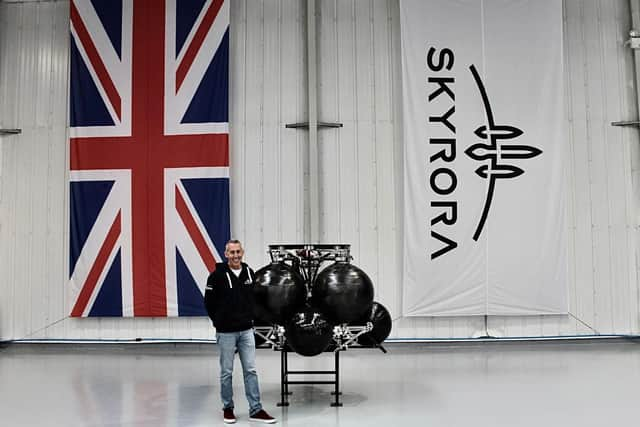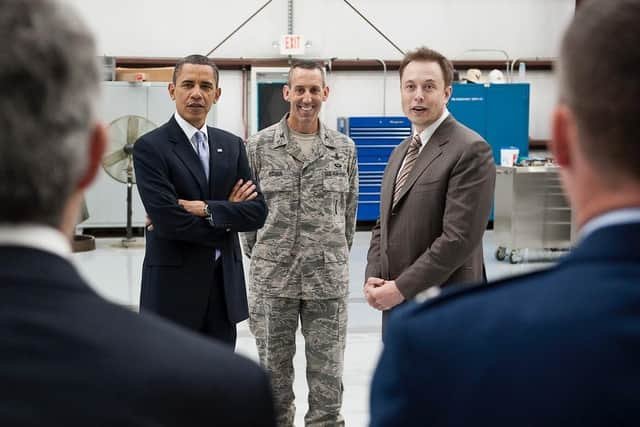Will Britain ever get off the launch pad? The importance of space capabilities for the future of British defence - Skyrora COO Lee Rosen comment
Receiving far less recognition than other sectors of the high-tech economy, what the space-related industry in this country lacks in headline-grabbers it makes up for in small, plucky-but-highly-capable businesses.
Across all corners of the UK – including right here in Scotland – the space industry has been for years growing at an impressive rate. Let me assure you there are very good reasons to get excited. However, for this burgeoning space sector to grow into a self-reliant ecosystem with strong commercial and defensive abilities, the UK has some major strides to take.
Advertisement
Hide AdAdvertisement
Hide AdA world leader in developing the technology for small satellites used in global communications, Britain has built a strong reputation for its plentiful companies focusing on small satellite applications. It’s also proven its commercial credentials, with the small satellite market directly contributing almost £15 billion to the economy. This space technology enables everything from mobile phone calls and GPS navigation to hourly weather reports.
There is, however, one vital part of the machine missing in the UK’s quest to become a space superpower – sovereign orbital launch capability. The ability to put a British rocket into space from British soil. The nation’s small satellite companies are entirely dependent on other nations for launch, with no player in the market yet able to have developed the technical capability to launch from UK soil. Sending these payloads overseas for launch not only adds to costs, but also diverts money away from the UK space industry and poses potential security risks.
To be frank, having sovereign launch capability is key to achieving a space superpower nation status. Domestic launches of British-built rockets carrying payloads will lay the foundations for entire industries and scientific endeavours that require access to space.
Let’s be clear though, that this is not about shunning the likes of the European or US space agencies and becoming an insular nation in space. Far from it. In fact, a recent visit to our facilities by the first Chief of Space Operations for the United States, General John W. "Jay" Raymond, will only help to bolster the key space relationship between the UK and US.


Collaboration with our partners from around the world is vital to developing the space economy – sovereign launch capabilities simply ensure that the UK does not fall behind in the global space race and becomes a European hub for launch.
Where has this strong domestic space economy originated and why can we still not launch our own satellites into space from the UK?
Investment into the UK space sector is a good place to start. The UK accounts for 6 per cent of total global space investment, only the US currently invests more. This has helped to support a thriving space-related start-up sector, although we are yet to see many of these companies scale to medium-sized enterprises, let alone become international players.
The UK is also trying to lead the way when it comes to launch regulations, something very few countries have established. The government has had feedback from stakeholders in the sector on what regulations should look like, but it’s a notoriously slow process, especially if you want to get it right and take an “as low as reasonably practicable” approach when it comes to risk and rockets.


Critical
Advertisement
Hide AdAdvertisement
Hide AdSpace is not and never will be simply a civilian arena. Military actors around the globe are highly active in this domain above the skies and space will continue to grow in strategic significance. Whether we like it or not, space is already a critical enabler of a nation’s defensive capabilities – intelligence, military and cyber activities are now reliant on space to varying degrees.
Frankly, I’m still an ex-US military man at heart, and we don’t go into battle without allies. That’s why in this global space America very much wants other nations, like the UK, to be able to stand on their own two feet and develop sovereign launch capabilities.
The honest reality is that at the moment, the UK is almost entirely dependent on the US for launch capabilities, both in terms of launch sites and US vehicles; that puts Britain at a significant disadvantage in both the commercial and defensive arenas.
At Skyrora, we know that mobile, agile and responsive launch and on-orbit capability can provide the UK with something it has been missing, and bolster its special relationship with the US.
While the UK has seven spaceports in development that are due to come into operation in the near future, our sovereign launch capabilities are still severely lagging behind. That can only be rectified with greater investment into the UK space sector, specifically into orbital launch providers.
With the sheer amount of quality innovation taking place on these shores, there’s no reason to think that, with productive dialogue between government and industry, and the combined support of public and private investment, we can’t as a nation aim higher – and build an industry that propels the UK towards being a space superpower.
Lee Rosen is chief operations officer at Skyrora
Comments
Want to join the conversation? Please or to comment on this article.
